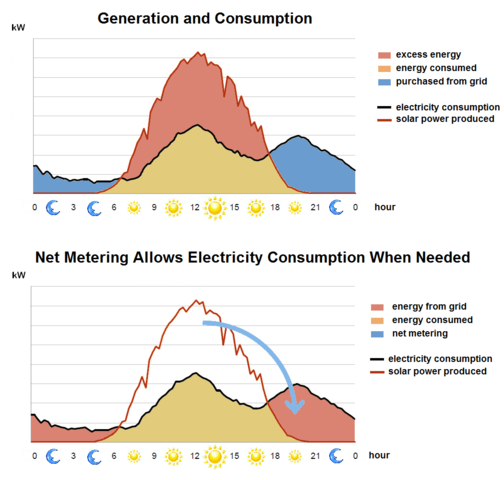Net metering is a billing mechanism whereby the consumers who produce their own energy can use it whenever they require depending on their utility requirements. Electricity can be produced from various sources such as sunlight, hydel, wind etc. Nowadays, there is a very high requirement for the consumption of electricity with such an advancing technology. This adds up to the excessive burden of producing electricity which ultimately affects our limited stock of non-renewable sources such as coal, etc. Therefore, net metering has been proposed so as to facilitate investment in renewable sources of energy. It provides an incentive to the consumer to produce their own electricity either by installing a PV (photovoltaic) system or through using windmills.

Net Metering Simplified
It works exactly like a bank account whereby we deposit our money and use it whenever we require it. Sometimes we may use less than what we have deposited then we have credit surplus in our account with a security that the remaining money can be utilized whenever we want again. Similarly, there are times when we need money more than we have deposited then we can take a loan from the bank to fulfill our requirements with a promise to return it.
Similarly, net metering functions through a utility grid which keeps records of energy generated and energy utilized. When a PV system is installed on the rooftop, it may generate electricity more than that is utilized by the household so the excess electricity produced is fed into the utility grid. But there might be a few instances where consumption by the household might be greater than the energy produced such as in night time then in such cases the electricity can be taken from utility grid itself. Net metering not only allows consumers to use electricity that is produced by them but it also allows them to use electricity provided by government if their usage is high. In such a scenario they would have to pay only for the excess electricity they utilize. A consumer can have credit or debit depending on its requirement.
Net metering laws
Net metering was first originated in united states and Minnesota is said to be the first to pass the metering law in 1983. Slowly, other countries too adopted such laws owing to its various benefits. However, the spread was slow because it has remained quite controversial. It has affected the different interest of different people thus posing new challenges.Net metering laws are different in each country. In India, few states have adopted net metering policies such as Tamil Nadu, Andhra Pradesh, Uttarakhand, West Bengal and Karnataka. Other states are too planning to make laws regarding it soon.
Benefits
Economic benefits:
- Net metering is a boon to consumers as it not only helps them to cut down on their electricity bills but has also aided them to fight against frequent power cuts.
- It helps them to use their produced electricity at a much later time depending upon their need which provides them with an incentive to produce more.
- It makes use of solar energy and wind energy which developing countries such as India is endowed with abundance so it would ultimately make them self-reliant.
- It creates new employment opportunities as an increase in demand for solar panels and windmills would create jobs for installers, manufacturers, retailers etc.
Environmental benefits:
- It provides an incentive to clean air. Pollution can be brought down to considerable levels with its frequent usage.
- Non-renewable sources are limited in stock and they take thousands of years to get replenished so according to sustainable management, one should aim at minimizing their use as much as possible. Relying on solar energy is more conventional and economical.
Conclusion
Net metering is not yet popular in many countries but the benefits it offers exhibit a promising future. Many states are already working on is policies and people are also keen on investing in PV system for reduced electricity bills.
Thank you for reading our article and if you have any doubts/queries/suggestions, please feel free to comment below. If you find this article useful and knowledgeable, please share it with your circle. You can even contact us privately through the contact form or through social networking sites like Facebook, Twitter, Google+ etc.




